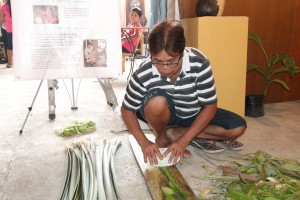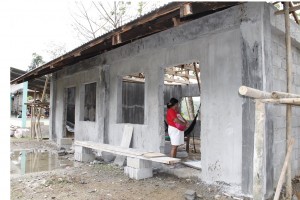By Maricar M. Calubiran
GIVING an Indigenous Peoples (IP) woman a chance to earn a living in a male-dominated world is fulfilling and redeeming at the same time. It makes one proud of herself and her IP group.
Sporting a pony-tailed hair and clutching a bag, Evelyn Asiong walks her way to the compound of Loctuga Elementary School, where a classroom is being constructed.
Asiong is a member of IP group Akeanon-Bukidnon who works as bodegera or warehouse person in the KALAHI CIDSS-NCDDP project in Barangay Loctuga, Libacao, Aklan.
She says the villagers gladly appreciate the policy of the KALAHI CIDSS-NCDDP which include women in the labor force, making her gender not an issue. Through the barangay assemblies, she was chosen to work as bodegera – a job that is new not only to her but to other villagers as well. She adds villagers first found it odd that KALAHI CIDSS-NCDDP is pushing for the inclusion of women in the project implementation.
Construction site is no world for women, more so, for IP women. But KALAHI CIDSS-NCDDP provides a fair playing field for all. It gives opportunities to IP as an integral part of the project implementation to ensure they benefit from the project.
For Asiong, her job is not difficult. In fact, she happily embraces her work, taking pride with every responsibility expected from her.
“Ako ang bodegera diri. Agahon pa ako gaagto diri, gina check ko kon may mag-abot nga materials. Kag ginalista ko et pila magamit nga materials sa adlaw-adlaw. Gina inventory bala na kon (I am the warehouse person here. I come here early in the morning, I check the materials delivered, and record the materials used for the day. I am doing an inventory),” she explains.
INCOME FROM PROJECT IMPLEMENTATION
“Naila gid ako dahil ginsaligan man ako et Kalahi sa pagtrabaho sa proyekto. Abu-abu gid pasalamat namon. Indi lang building ang natao sa amon pati trabaho (I am very happy that KALAHI trusted me to work in the project. We have so much to thank. It did not only provide us a building but also jobs),” says Asiong.

She receives a net pay of P150 daily – an amount, she says, which can already supplement her family’s daily needs.
“Abu-abu gid ya nabulig KALAHI sa amon, sa karon hay tagdalawat et bugas kag sa amon kalalakin-an dugang nga income dahil sa trabaho. Ang trabaho namon panguma lang. Dugang et income kag bakal pagkaon sang amon mga estudyante. Ang trabaho namon panguma kag gakigi sang pina fiber (KALAHI helped us a lot, especially in buying rice, providing work to men means additional income. Our primary work is farming and hand-stripping of piña fiber),” she says.
Hand-stripping is one of the three methods in abaca and piña extraction. It could also be done through spindle-stripping and decortication.
“Naila mga tawo kay may trabaho ila mga asawa. May saligan sila kon mag utang sa tiangge. Kon wa man Kalahi hay do maski kaon bukon et tawag kon sa tatlong beses sa isa ka adlaw. Syempre kon may obra may saligan ibayad (The people are happy because their husbands have jobs. They are assured that they can pay their debts in store. If there is no Kalahi, they could not eat three times a day. Since they have work, there is a guarantee that they can pay their debts),” says Asiong
She says it was also decided during the barangay assembly that parents will contribute P20 per student as part of the community’s local cash contribution aside from the P50 deducted from the daily wage of the skilled workers and P10 from the laborers.
Asiong says the cash contribution is part of the village response to the project for providing them a school building and part of their bayanihan. “Abu-abu bulig sang KALAHI, kaila man mga tawo luwas dugang trabaho, patindog pa sang eskwelahan para sa amon estudyante (KALAHI is a great help, the people are happy, aside from providing jobs, they will construct a school building for our students),” she says.
Asiong attributes the increasing number of students in the community to the Pantawid Pamilya Pilipinong Program, which requires household to send their children to school. To date, there are 147 household beneficiaries of conditional cash transfer in Loctuga.
“Gutok man mga estudyante sa sulod sang classroom. Abu-abu Grade 1 pupils, 100 kabilog. Tapos Grade Two pataas Grade 6 abu-abu man (The students are overcrowded in the classroom. There are 100 pupils in Grade One. There is also an increase in the number of pupils from Grade 2 up to Grade 6),” she adds.
STEPS TOWARDS RECLAIMING TRAMPLED DIGNITY
Aside from economic benefits brought by KALAHI CIDSS-NCDDP in her village, Asiong says her experiences as warehouse person is significant in her life. It has empowered her as a woman and made her contribute in the project implementation.
“Sa KALAHI natuto ako ano et mga klase sang materials ginagamit sa

construction, ano hitsura ka 9mm nga kabilya kag iban pa. Nag antigo man ako sa construction dahil sa KALAHI CIDSS. Sang una natun-an ko lang bilang treasurer sang USWAG Foundation, mag account sang kwarta karon nag antigo na akon mag inventory et construction materials ( In KALAHI CIDSS I learned how to identify what are the kinds of construction materials…the 9mm iron bars and others. My knowledge in construction work is honed because of KALAHI CIDSS. Before, I am only knowledgeable in counting money because of my work as treasurer in the USWAG Foundation but now I am also knowledgeable in construction),” says Asiong.
In KALAHI CIDSS-NCDDP, women’s participation are encouraged and given much emphasis especially with the Indigenous Peoples. With all pride and dignity, Asiong is thankful to Kalahi-CIDSS.
“Wala ko ginakahuya nga IP ako, proud ako nga kasuhod man ako sa sini nga proyekto (I am not ashamed that I am an IP, I am proud that I am part of this project),” she says.
With her experiences, Asiong can now speak in barangay assemblies even if she feels nervous, adding she feels that she and several IPs are now recognized and accepted as persons by persons living in the lowlands./dswd6
